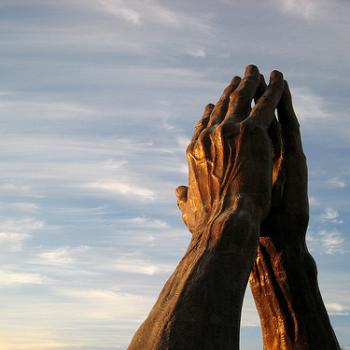
I fell in love with Dungeons & Dragons as a jr. high kid in the 80s. I spent hours and hours reading manuals, crafting dungeons, and playing games with my friends. I didn’t grow up as a Christian, but I was well aware of the hand wringing in evangelical circles. I had some friends who had to play in secret, and I had others who couldn’t play any character class that practiced magic. I always found it funny that, as Christians, they were allowed to solve problems through violence, just not magic.
D&D hit at about the same time that I discovered Greek mythology. It was just a perfect marriage of fantasy and epic storytelling that appealed to intelligent kids with overactive imaginations.
But I didn’t just love it for the fantasy. I loved the game because of the mechanics. The way the game was constructed helped me understand the world around me and helped inform my ideas about how the world operates in ways that still impact me.
A D&D primer for the unaffiliated
Maybe you’ve bought into the idea that D&D is for goody, LARPing nerds, so you’re not really into it. That’s OK. Let me just explain the mechanics of the game because it will be integral to my point.
Dungeons & Dragons is a story that you and your friends get to take part in. But you don’t just listen to the story; you make decisions that actually impact how it progresses. The storyteller is called the “dungeon master” (DM), and it’s their job to tell the story and run the mechanics of the game so the story can progress. Their primary job is to allow the players to impact the story without running it completely off course.
The arbitrary nature of dice rules the world of D&D. Without getting into too much detail, various dice are rolled when you swing a sword, try to influence another character, attempt to read a scroll, etc. If the roll is high enough, you succeed. If it’s too low, you fail.
What makes the dice mechanic work is that there are a million other variables at play. Maybe you have a sword that adds 3 points to your swing against a certain kind of monster. That’s awesome. On the other hand, perhaps they have armor that negatively affects that dice roll.
To make it as simple to understand as possible, most things affecting gameplay impact how the dice lands. If your intelligence is high, it will positively influence dice rolls related to stuff like memorizing spells or whether you notice a hidden clue. If your dexterity is high, you character is going to have a better chance of tumbling out of the reach of that fireball.
As your character progresses, you “level up.” That basically means that you get new skills and abilities, many of which add positive modifiers to your dice rolls. As you go through the game, you also pick up gear that improves your rolls. But the world you’re in is leveling up, too. The monsters get more powerful, the traps more dangerous, etc.
But no matter how powerful your weapons or spells are, you can still roll poorly. In some editions of D&D, rolling a 1 was an immediate critical fail. If you were swinging a sword and rolled a 1, in some cases, you ended up falling—or even stabbing yourself.
D&D and the Christian worldview
Many Christians have a view that God ultimately decides everything that happens in the world. On the most extreme end of the spectrum, there is nothing the players (us) can do to impact the story. God has preordained how every element plays out. Players can make decisions, but none that truly affect the outcome. Before the game was ever laid out, it was already decided who would make it to the end and who would become a troll’s Happy Meal.
This is a critical worldview for people who need to find meaning in everything that happens. The “everything happens for a reason” crowd needs a fatalistic universe to make sense of life. But it’s mostly an ideological placebo and doesn’t make sense with how they live the rest of their lives. They might say, “I’m not going to get vaccinated against COVID because if it’s my time to go, then it’s my time to go.” But those people are still putting on their seatbelts, refrigerating their leftovers, and taking medications. They lean on their lack of agency when it suits them, but still do things that “affect the dice roll” in every other part of their life.
Embracing the arbitrary
While I don’t believe the universe operates with the capriciousness of a die roll, I do think that it operates in entirely unpredictable ways. The D&D mechanics helped me understand the dizzying number of variables that impact our daily experiences—often in unseen ways. The world might not operate by chance, but many unknown parameters influence how things come to pass.
For the Bible-believing Christian, there are actually more factors exerting influence on what transpires. It’s not just the free-will decisions of humans, but Christians have to wrestle with the idea that the world is also occupied by angelic and demonic beings’ free-will decisions. If they actually believed the Bible, they’d wrestle with the fact that there is more unknown in every situation than known. But that’s not what happens. Instead, Christians embrace the idea that God’s will completely collapses all of these variables to the point that it’s the only thing that matters.
God: the ultimate dungeon master
When you think about it, many Christians already see God as a dungeon master of sorts, just not the kind you’d ever want to play with. God is telling a story, and God’s going to strongarm that story into being. The decisions you make don’t matter and won’t have any effect on the game—and no one wants to play with that DM.
The actual Christian scriptures are a lot more nuanced than that. On the one hand, the Bible tends to speak toward God’s foreknowledge, but it also implores specific behavior from people with constant warnings that disobedience has real-world impacts on others—even people who might be doing everything right.
For instance, imagine that you’re a 23-year-old female on a road trip to visit her parents at Christmas. Does she make it safely? Being 23 gives her a +3 to her reflexes. Maybe she’s working her way through school delivering pizzas. That time behind the wheel gives her another +3 to her driving skill. But it’s raining out and her tires are a bit worn. Maybe that’s a -5. And here I come in the opposite direction after having a couple of beers with dinner, trying to check my text messages, and I swerve into her lane.
All of these variables come into play, but Christians want to pretend that the only one that matters is how the DM (God) wants the story to go. And while that is a huge modifier, it isn’t the only one. When Jesus says, “He causes his sun to rise on the evil and the good, and sends rain on the righteous and the unrighteous” (Matt. 5:45). He’s basically talking about a game dynamic. God doesn’t just manipulate these variables at will in order for things to turn out a specific way.
You want more sunshine than rain? Move to a place with less rainfall, but God isn’t going to turn the Pacific Northwest into Arizona—even if you pray really, really hard.
What does the DM know?
Nothing sounds appealing about playing D&D with a dungeon master who refuses to allow the party to affect anything that happens in the game. The DM has already decided how everything will turn out, and he’ll even fudge the game mechanics in his favor to ensure that everything turns out the way he wants.
And nothing is appealing about a God who operates the world the same way.
Interestingly, what you believe about the mechanics of the world dictates how you read Scripture. For instance, most people look at Jeremiah 29:11 through a self-serving, fatalistic lens, “For I know the plans I have for you,” declares the Lord, “plans to prosper you and not to harm you, plans to give you hope and a future.”
This is perfect for a lot of Christians because it gives the world a generous flavor. God’s got everything under control, and nothing is going to happen that’s bad. But that’s not real, and we know that by experience.
But this verse is more like a dungeon master telling his party, “I plan to prosper and reward you. But some of your characters might die. If you see every encounter as an opportunity for a fight and make stupid decisions, you’re not going to live long. In fact, some of you might not make it by simple chance. But as a party, my goal is to get you through the end of this story, not to harm you.”
My Dungeons & Dragons experiences helped me understand that God’s foreknowledge doesn’t have to be exhaustive to be amazing. A dungeon master gets to where he can predict with great accuracy what the characters will do in various situations. As a matter of fact, you learn to manipulate the story a bit based on what you know about the character’s proclivities. And in every situation, a thoughtful DM is running scenarios in their head based on a player’s typical behavior.
I think God’s foreknowledge might be similar to a dungeon master in the following ways:
- The DM knows how the story is going to end
- The DM has to recalibrate the story based on player behavior constantly
- The DM can manipulate arbitrary game mechanics, but to do so too often ruins the mechanics for everyone
- The DM can ultimately choose to manipulate any mechanic to fit the story but typically chooses not to because it’s much more interesting for everyone (including the DM) if the experience is collaborative
- The DM’s foreknowledge is really more of an extension of his will (the ability to craft a reactive story that gets players to follow a specific storyline) and his understanding of potential possibilities based on the players’ past behavior
- The DM is often surprised at how things turn out and must revise his plans
In a lot of evangelical circles, it’s blasphemous even to suggest that God’s ever surprised. But there are plenty of times when God expressed disbelief at the way people responded to stimulus. For instance, God expected Israel to respond to goodness by being fruitful, but they weren’t (Is. 5:1–5). And God tells Jeremiah:
During the reign of King Josiah, the Lord said to me, “Have you seen what faithless Israel has done? She has gone up on every high hill and under every spreading tree and has committed adultery there. I thought that after she had done all this she would return to me but she did not, and her unfaithful sister Judah saw it (Jer. 3:6–7).
Playing God’s collaborative game
I don’t think it’s helpful for people to assume that God’s will is the only variable in the universe that matters. It’s clear from the biblical trajectory that Yahweh is an incredibly collaborative deity. In fact, that’s one thing that separates the Christian understanding of God from many other deities. God bent the universe’s mechanics toward collaboration. God can choose to override these mechanics through sheer willpower but doesn’t seem to want to.
But every one of us has the ability to impact the variables that dictate how certain encounters and experiences come to pass. I can educate myself. I can develop skills. I can form alliances. The decisions I make have a direct impact on the world around me, and there is an opportunity cost for every one of them. I can focus my energy on education, but the time I spend there can be spent leveling up other areas. I can get a doctorate in chemistry, but it won’t necessarily help me when a challenge calls for sheer brute strength.
This is one reason community is so integral to the gospel story. None of us are as strong as all of us. When we go through God’s story in a well-formed party, we get to draw on everyone’s strengths and abilities.
For the Christian, you add a whole new section of skills that impact the storyline. Prayer is a big one. On some level, prayer is like asking the dungeon master to swing a dice roll in your favor. God might hear our prayer and add a +5 to that roll, but we’re utterly ignorant of all the other variables affecting that roll. We want to assume that every time we pray, God simply chooses whether to collapse all the other variables so we can have our way. Can God do that? Sure. But that doesn’t seem to be the Almighty’s preference. Instead, prayer appears to operate as a considerable modifier to the roll. In fact, the more faith we have, the more influence it might have.
Dungeons and Dragons has really impacted the way I see the world and my faith. I know that sounds like blasphemy to some, but it’s true. I don’t see myself as a passive actor in the story God’s trying to tell. On the contrary, I think the choices I make (or refuse to make) have a huge impact on how the story unfolds around me—and I think that’s by design.












